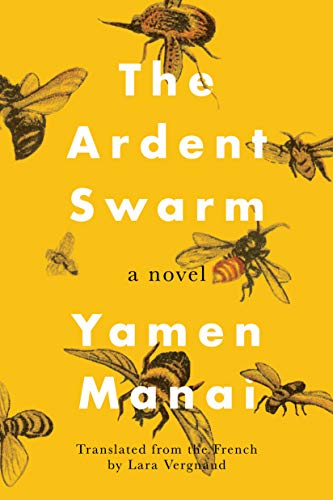Book review: The Ardent Swarm by Yamen Manai

The Ardent Swarm: A Novel
by Yamen Manai, translated by Lara Vergnaud
Expected publication: February 1st 2021 by Amazon Crossing
ISBN: 1542020476
Pages: 174
Genres: literary, political, satire
Original language: French
Literary awards: Prix de l’Algue d’Or Nominee (2018)
From an award-winning Tunisian author comes a stirring allegory about a country in the aftermath of revolution and the power of a single quest.
Sidi lives a hermetic life as a bee whisperer, tending to his beloved “girls” on the outskirts of the desolate North African village of Nawa. He wakes one morning to find that something has attacked one of his beehives, brutally killing every inhabitant. Heartbroken, he soon learns that a mysterious swarm of vicious hornets committed the mass murder—but where did they come from, and how can he stop them? If he is going to unravel this mystery and save his bees from annihilation, Sidi must venture out into the village and then brave the big city and beyond in search of answers.
Along the way, he discovers a country and a people turned upside down by their new post–Arab Spring reality as Islamic fundamentalists seek to influence votes any way they can on the eve of the country’s first democratic elections. To succeed in his quest, and find a glimmer of hope to protect all that he holds dear, Sidi will have to look further than he ever imagined.
In this brilliantly accessible modern-day parable, Yamen Manai uses a masterful blend of humor and drama to reveal what happens in a country shaken by revolutionary change after the world stops watching.
Check out my Storygraph review of The Ardent Swarm for content warnings.
My thoughts
“Read”-the first heavenly word, the first commandment, and the key to all things.
How much I agree!
This novel, published originally in French, is very short and very charming, a deceptively simple but well-crafted allegory of politics in the Arab world after the Arab Spring.
It reminds the Western reader – in areas with conflict or poverty, problems don’t just magically go away when you replace a dictatorship with democracy. After the revolution is over, after the world stops watching, what happens?
How many people think about this question? Or have we simply brushed off our hands and closed our eyes to the aftermath?
What was easier to hijack than democracy? Like most things in the world of men, democracy was principally a question of money, and the prince had plenty.
From time immemorial, the gifts of princes have always been poisoned.
In the unnamed North African country where the story is set, newfound democracy, press freedom, and burgeoning sensibilities for civil participation are exploited by a small, gas-rich Arab state called “Qafar”. Qafar’s political interference brings a fundamentalist wave which takes over their world, and along with it, an invasive species.
In real life, Qafar and its ruler Abdul ban Ania, and the Kingdom of Arabia and its King Farhoud do not exist. The North African country in which most of the book is set is also conveniently anonymous. On the other hand, more politically distant countries, such as Japan, China, and Italy are directly named, and Silvio Berlusconi even gets a cameo role.
Although it’s fairly obvious that Qafar is Qatar and the Kingdom of Arabia is Saudi Arabia, not using real place names and setting part of the novel in Japan lends the story a certain universality.
It describes patterns of politics – populism, change, modernity and tradition – things broadly familiar to many times and many places.
That is not to suggest that The Ardent Swarm should be literally applied to some other post-Arab Spring country with a totally different history, culture, and political situation from Tunisia. Or as thetranslator, Lara Vergnaud , puts it, “Tunisia does not equal Egypt does not equal Syria”.
The Ardent Swarm is hilarious, a true pleasure to read, and full of pithy quotes like:
Other people. Again. Often hell, sometimes salvation.
“Can we talk about night beards, who vandalize, and day beards, who govern? Is there a link between the two?”
I really liked Sidi, the main character, because he’s definitely a relatable guy in some ways. Seeing how messed up the world is, he just wants to bury his head in the sand (or in his case, in a bee hive) and ignore all other humans. Unfortunately, he lives in a society, and he just can’t escape that fact.
The conceit, beekeeping and politics, played out well and didn’t feel heavy-handed. Although there are some very dark moments in the story, it was a lighthearted, optimistic read, full of comedic and satirical elements.
I chose this book from January 2021’s Amazon Kindle First Reads.
Overall rating
| The Judgment | |
|---|---|
| Writing | |
| Plot | |
| Characters | |
| Creativity | |
| Themes | |
| Enjoyment | |
| Overall | |
Overall, the book is great, a masterful political novel. However, the author used a deus ex machina resolution (which sometimes works, but felt forced on this occasion). The ending was also weak and somewhat unsatisfying – everything was just too convenient. Maybe if there were a few more chapters, it would be much improved? This is unfortunately the case for so many novellas and short novels. Regardless, I think it’s worth reading!